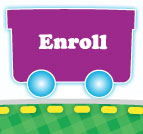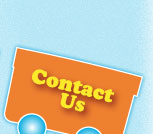

About the Infant Program
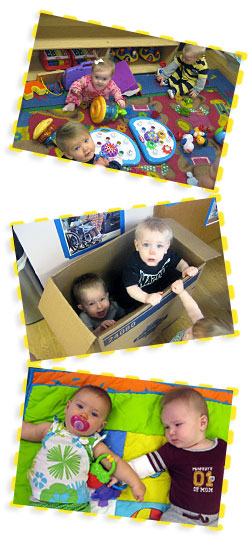
Research has proven that a human’s brain is the most active during the sixth and seventh months of life. Stimulation and positive interactions help infants to develop brain structures which will benefit them later in life. The loving staff at Early Education Station present the best possible environment for this very important developmental time of your child’s life.
Infant staff stay aware of emerging skills, such as crawling and rolling. They give infants opportunities and encouragement to progress with their development. Numerous toys are available to stimulate an infant’s brain growth.
Infant formula, baby cereal and baby food are provided for infants by the school at no additional cost.
Things to Bring:
- Diapers and wipes
- Bottle items (Can be labeled and sanitized at school, if desired)
- Complete change of clothing appropriate for the season
Things Not to Bring:
- Good clothes
- Toys (Except for appropriate naptime toy)
- Food treats/Sippee Cups
- Valuables
The One Year Old Program
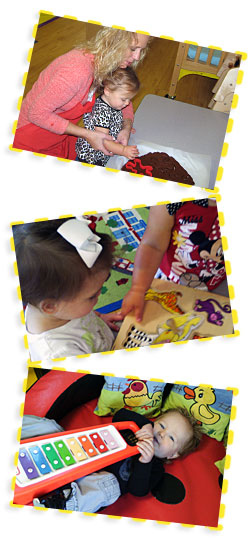
One year old children are beginning to express themselves more than ever before. They love to interact with others and show interest the world around them. Language opportunities are extremely important at this stage in life. Monthly themes and daily activities keep the toddlers busy and excited, and promote many learning skills.
Early Education Station has a younger class of one year old children and an older class of one year old children in order to meet each child’s individual needs. Because this age child develops and grows so rapidly, families and teachers are able to determine which classroom is more appropriate.
The one year old classroom is stocked with materials and toys to stimulate brain growth. The children enjoy watching and interacting with their peers. Much giggling and laughing is often heard in the one year old classroom. There is also a soft corner for relaxing with books and hearing stories.
All teachers and assistants help with nap time so that children can have special attention while settling down for nap.
"My Day" reports are sent home each day showing the skills presented to the children. Assessment reports completed every nine weeks to evaluate each child’s readiness for Kindergarten and parent teacher conferences are offered twice a year.
Things to Bring:
- Diapers and wipes
- Bottle items (Can be labeled and sanitized at school, if desired)
- Complete change of clothing appropriate for the season
Things Not to Bring:
- Good clothes
- Toys (Except for appropriate naptime toy)
- Food treats/Sippee Cups
- Valuables
The Two Year Old Program
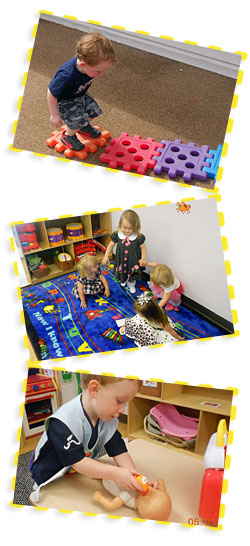
Two year olds learn at a rapid pace. They are beginning to express more language, learn self help skills and potty train. They love to explore and are beginning to gain much independence.
Early Education Station has a class of younger two year old children and a class of older two/younger three year old children in order to meet each child’s individual needs. Because this age child develops and grows so rapidly, families and teachers are able to determine which classroom is more appropriate. Learning centers and developmentally appropriate group activities are used to help the children grow and develop.
Children are often offered activities which promote eye-hand coordination and fine motor skills. These essential skills will greatly benefit children when learning to write.
Teachers present new activities to children each day that promote social skills. As children work/play alongside each other, they gain positive social skills which will stay with them the rest of their lives.
Two year olds love outdoor play! Weather permitting, children have one hour of outside time each day.
All teachers and assistants help with nap time so that children can have special attention while settling down for nap.
"My Day" reports are sent home each day showing the skills presented to the children. Assessment reports completed every nine weeks to evaluate each child’s readiness for Kindergarten and parent teacher conferences are offered twice a year.
Things to Bring:
- Diapers and wipes
- Bottle items (Can be labeled and sanitized at school, if desired)
- Complete change of clothing appropriate for the season
Things Not to Bring:
- Good clothes
- Toys (Except for appropriate naptime toy)
- Food treats/Sippee Cups
- Valuables
The Three Year Old Program
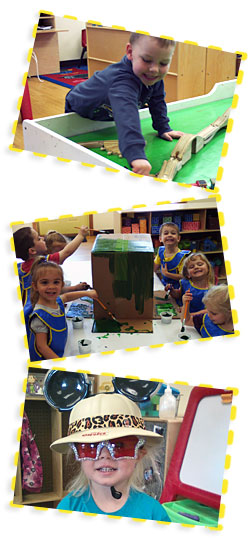
Early Education Station has a class of older two/younger three year old children and a class of older three year olds in order to meet each child’s individual needs. Because this age child develops and grows so rapidly, families and teachers are able to determine which classroom is more appropriate. Learning centers and developmentally appropriate group activities are used to help the children grow and develop.
Three year old children are beginning to show interest in others and group activities. Monthly themes, weekly topics and daily activities are used to give children pre-readiness skills, and to keep the children interested in learning. The children learn numerous skills all while they are having fun. Children spend their day interacting in active learning centers, small group, and large group activities.
Children are given daily opportunity to practice prewriting skills. Coloring sheets are not presented so that children develop thinking and problem solving skills, and have confidence in their ability to create.
Math is incorporated into active learning stations throughout the day. Children are often engaged in activity where they experience one-to-one correspondence, number recognition, matching, sorting, etc.
Large group activity is presented to the children each day. The repetition of singing, counting, rhyming, and recognizing name helps children to master the foundation skills they will need to excel in school years.
The sensory station is great fun for the children all while the hands-on exploration helps them learn about basic science concepts, such as gravity, weight, balance, and volume.
The outdoors are utilized daily (weather permitting) to help children enhance gross motor and other skills.
“My Day” reports are sent home each day showing the skills presented to the children. Assessment reports are completed every nine weeks to evaluate each child’s development.
Things to Bring:
- Diapers and wipes
- Bottle items (Can be labeled and sanitized at school, if desired)
- Complete change of clothing appropriate for the season
Things Not to Bring:
- Good clothes
- Toys (Except for appropriate naptime toy)
- Food treats/Sippee Cups
- Valuables
WV Pre-K Program
West Virginia PreK is a part of the West Virginia Board of Education. Children who are age four by September 1, or who are age three with a development delay of 25% in two or more areas, are eligible for this program. The program is designed to provide opportunities for children to receive prek services in a setting that is most appropriate. There is no charge for this program.
Programs within West Virginia are inclusive, including county boards of education, Head Start programs, and childcare programs, so that all children have access to high quality programs and are not segregated by income, ability, funding stream, care needs or other characteristics.
The WV PreK classrooms at Early Education Station are a combination of staff from Mason County Schools, Head Start and Early Education Station. The WV PreK classes are in operation Monday through Thursday (8:00 am till 3:00 pm) during all days of operation for Mason County Schools. A four year old after school classroom is available for any children needing care after school hours. The four year old childcare class also operates any day the school system is not in session, including inclement weather days, breaks and summers.
After School Program
Early Education Station offers an after school program for children PreK to age 12. Mason County Schools provide bus transportation for the children that attend the Pt. Pleasant Primary School and the Intermediate School.
The children have opportunities to receive help with homework from the teachers and their peers.
Instead of a snack, afterschool children are able to have a full meal consisting of a main course, a fruit, and a vegetable. Meals are included in tuition costs.
Food Program

Early Education Station provides breakfast, lunch and snack to all children at no additional cost. Infant formula, baby food, and baby cereal are also provided by the school for the younger children. Afterschool children are able to have a full meal consisting of a main course, a fruit, and a vegetable, also at no additional cost.
Early Education Station participates in the USDA Food Program and follows strict nutritional guidelines.
Children eat family style while at school. Older children are very proud when they dip their own food and pour their own drink.
© 2012 Early Education Station | website design by ka-king designs



